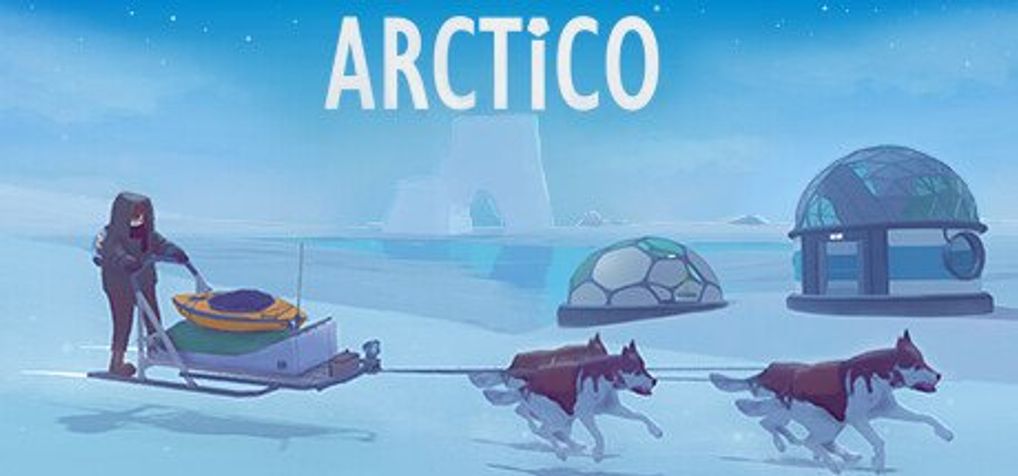Arctico
I’m thinking about the nature of meditation, about the idea of clearing the mind, and by doing so, finding a sense of peace and tranquility. I’ve meditated in the past, and while I did reach that sense of emptiness, I found that other thoughts crept back in. There’s no stopping them, these thoughts that dig in their claws and pull themselves, insidious, back into the waking consciousness. I want to meditate, but I don’t, because my thoughts don’t need more excuses to creep.
When discussing casual games, though, I think it’s important to consider meditation and what it’s trying to achieve alongside the goals casual games are trying to achieve. Casual games, like most of the rest of the games industry, present a certain degree of escapism, albeit a total escapism rather than an escapism into a certain experience. Rather than asking the player to be an assassin or a space colonist or a soldier, casual games tend to ask the player to be something quiet, or to maybe be nothing at all. In a sense, some casual games can be meditation aids, giving the player’s digits and mind something to focus on while also asking it to focus on nothing in particular. There is nothing within the game holding attention and nothing that will at any point need attention. The entire point is the escapism into nothing.
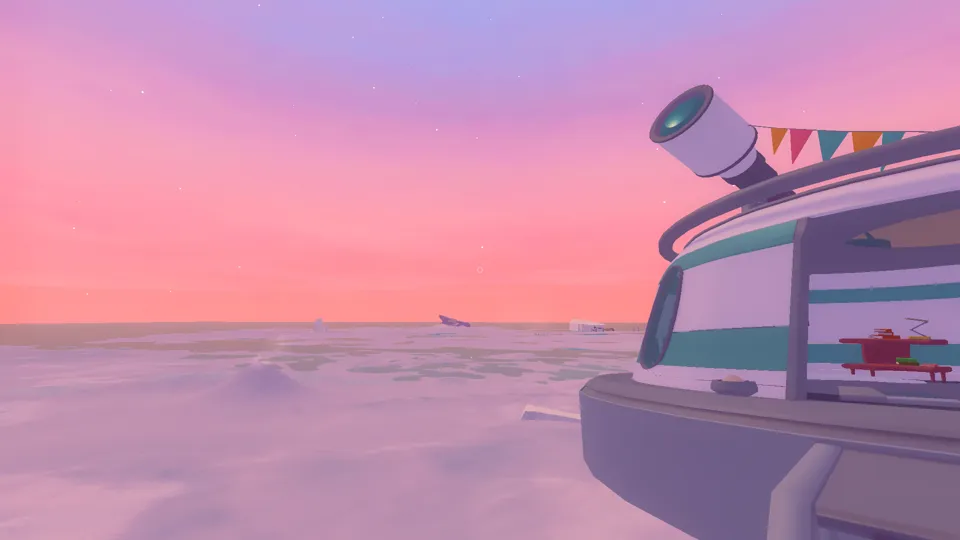 That’s a whole lot of nothing.
That’s a whole lot of nothing.
Arctico is a casual survival, adventure, base-building game, and if “casual” seems like the odd genre out there, I promise it makes more sense than it sounds. You play as an explorer tasked with recovering your mentor’s research. You have a team of four sled dogs and a sled, a base, and a vast Arctic landscape. Though you’ve been told to find your mentor’s research, there is no particular goal or pressure to do so - the point of the game is not the destination, but the journey.
As with any base-building game, there are resources to gather, though this process is fairly simple. There are areas that have certain respawning resources, and the player needs to go to them and gather the resources. A base can be upgraded to produce resources. Survival is also straightforward, though again, much, much simpler than other survival games. The player can go an astoundingly long time without food, and I’m not sure the game tracks water or sleep at all. The dogs are also shockingly resilient, being content with a fish every few days to fuel their mad dash through the snow. The point of the game, again, is not the base or the survival. These feel like the barest possible window dressings to provide some sense of motivations. The point of the game is the journey through the snow.
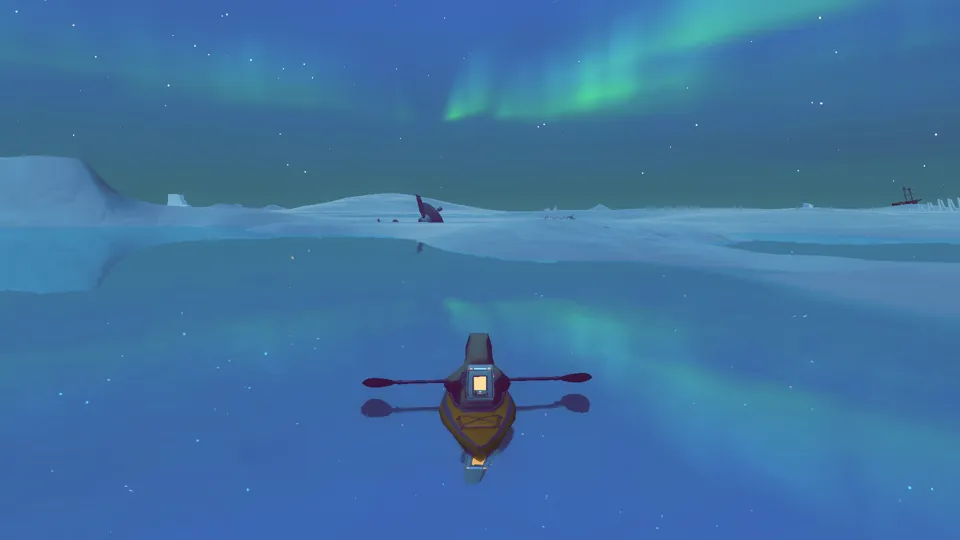 There is a lot of snow.
There is a lot of snow.
Arctico is a game about patience, and about journeying through patience. There is a map, but to use it, the player needs to dismount their sled and recalibrate. There is a mini-map marker, but it’s optional, and I usually left it off. The only fast travel is the fast travel the player builds, and I built none. The player travels at the speed of the dog sled, moving slowly across the landscape, navigating more or less by the distant shapes that gradually manifest into something more real before fading away again into the endless expanse of white.
Even after arriving at these landmarks, there isn’t anything to particularly hold the attention. There are no valuables to gather, or anything to particularly interact with. A location might have a note or some rapidly respawning resources, but otherwise, it is empty, and the player is alone. There is no one else on the ice, and nothing but the journey you set for yourself.
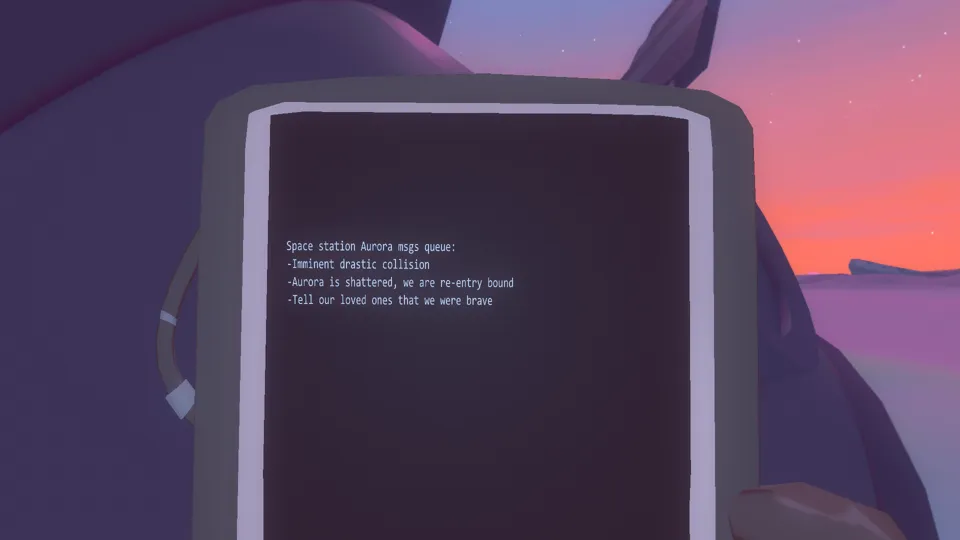 The writing definitely has some moments.
The writing definitely has some moments.
This brings me back to idea of meditation, and what the purpose of a game is. Any time I look at a walking simulator or visual novel, there are always those voices saying that a game needs to have some challenge, some interactivity, some agency on the part of the player to be a game. The player needs to have an impact on the world around them, and simply exploring the story isn’t enough to count. I disagree with those voices, and always see merit in exploring a story and having video games be a vehicle for story-telling. Stories can be told through any number of mediums - why should games be exempt?
Arctico is an interesting example, though, because it has no story, at least not beyond the one the player has decided to tell themselves as they wander the Arctic. What’s being explored here isn’t a story, but rather, the self. Playing Arctico is an act of meditation, of setting a vague goal and letting the mind clear as dogs bounce across a vast white expanse. As I played, I found myself not thinking about the game at all, or even this review. I thought about the story I’d been reading the evening before, about where it was going and where it could go. I thought about my partner, about adventure, and I thought about the sun rising over the city out my window. When my sled reached its destination, my thoughts stayed distant. I went through the rote motions of gameplay while my mind continued its journey, fueled by the gentle motion of my hands and the knowledge it had nowhere else to be, nothing else to do, and no obligations until the game was done. Through Arctico, I found a sort of inner peace, however unintentional. I ignored the base building and the survival and just let the sled drift, following the dogs wherever they led, while my mind left on its own journey.
It was nice.
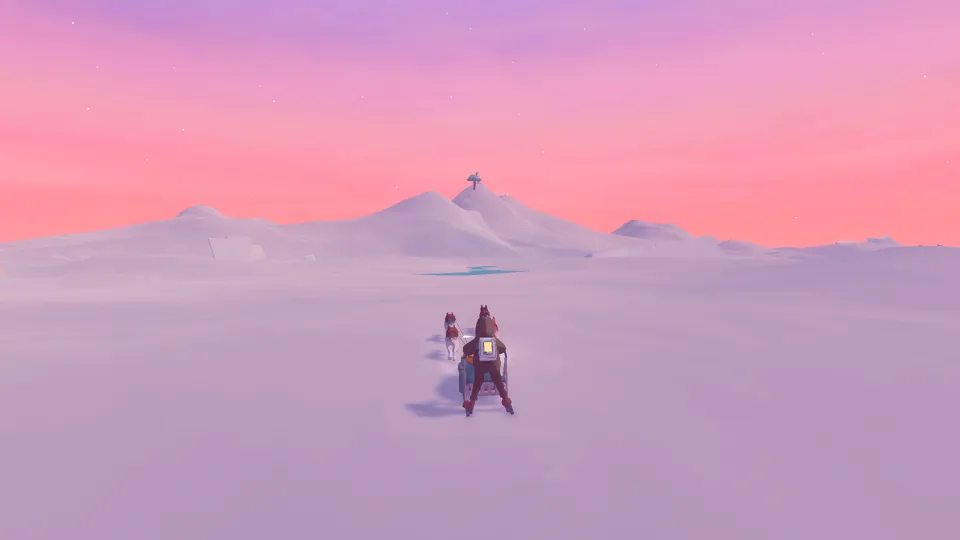 Did I mention the snow?
Did I mention the snow?
I find it difficult to decide how I feel about Arctico. I suspect that how I played it is simultaneously correct and incorrect, and that the devs would likely be completely okay with that. I played it without playing or really engaging with any of the mechanics. If anything, the game is a bit weakened by billing itself as a base-builder or survival game. It does the bare minimum of both, but even that minimum detracts from the zen-like experience of scooting across the ice with no particular idea of what lies ahead. The base-building mechanics give the player a goal in a world that is perhaps better enjoyed without one. I was happy to ignore it.
I don’t think I’ll play Arctico often, but I will play it again. This meditation focus is there in my library, inviting me to leave my mind open, but my fingers busy, guiding dogs to unknown points while my mind drifts off in its own world. It’s a catharsis, and there’s beauty in that.
Developer: Claudio Norori, Antonio Vargas
Genre: Casual, Adventure
Year: 2022
Country: Peru
Language: English
Play Time: 11 Hours
Youtube: https://youtu.be/lRSws2wW9cA
